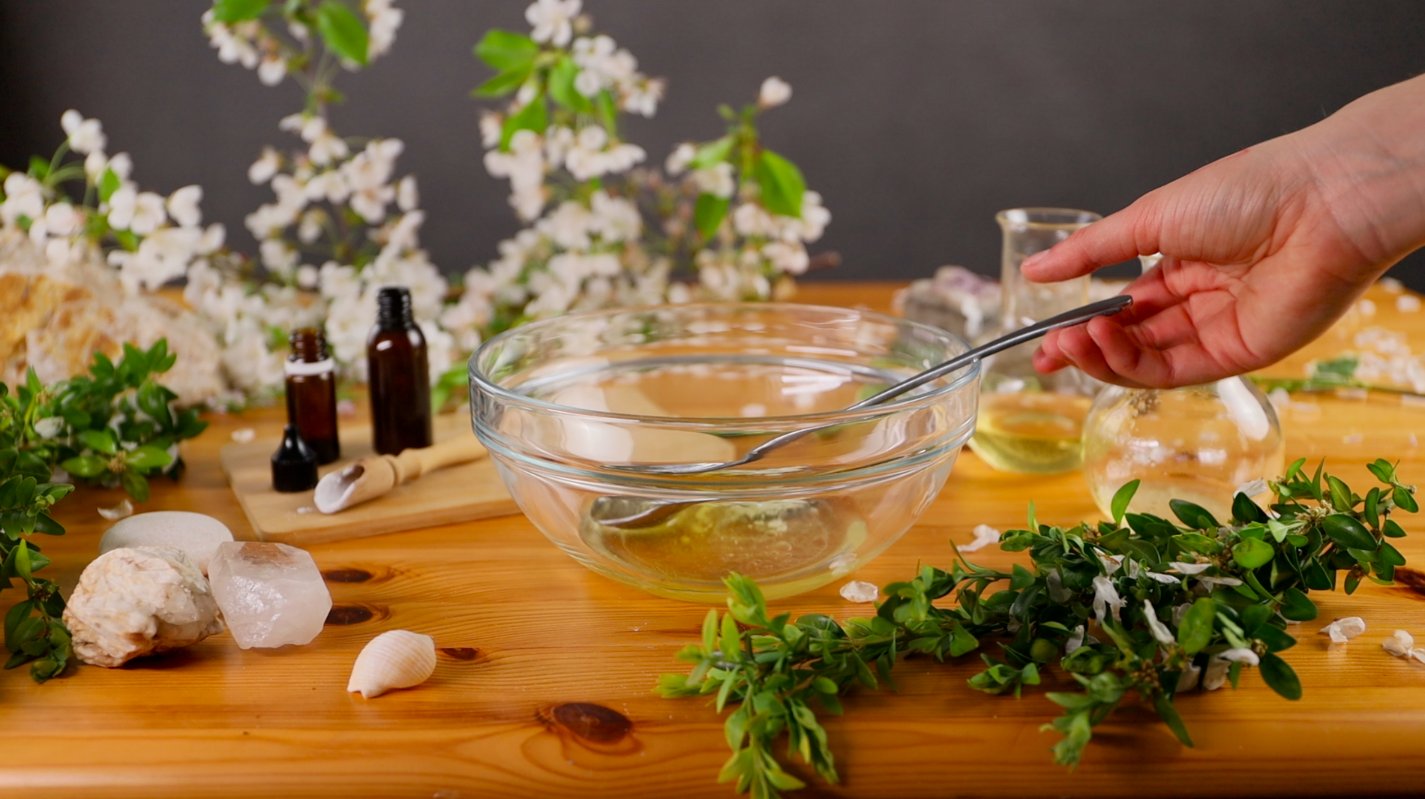If we buy a good quality “natural” product or even make one at home, it is good to know how to use it. That seems obvious, but I know from my own experience that it is not. I don’t understand why manufacturers of “organic and eco” products don’t better prepare their consumers on how to use the product properly. This is the basics! So let’s go over a few basic things that can help with the effectiveness and effectiveness of “natural” cosmetics.

- Products without water (lotions, soaps, detergents and other products) – apply with a little water, but a very small amount of product is enough (e.g. 4 drops of oil, lotion on the tip of the finger…). Really use very little amount of the lotion or oil you have made so you don’t get greasy. Spread the water with the product in your hands first, and then apply it on your skin. If it’s for the body, then it’s ideal to get out of the shower and apply the lotion or oil to the still unrubbed skin. There is no universal instruction because we all have different skin and we all like something different. So the only advice is, keep trying. 🙂 Buying waterless products is very eco-friendly, cost-effective, and practical, I personally love them! Like I said, you have water at home, don’t pay extra to the manufacturer for it. For example, shampoo is about 80% water.
- You know the ingredients – this is the most important thing… The second most important is the price (home-made moisturizer, mask, make-up remover, etc. will cost you a fraction of the price compared to store-bought products). Sure, some things you can’t make yourself, because you might not know the ratios of ingredients, but you can make something different depending on your own skin or hair type.
- Babies and children don’t need tons of cosmetics, that’s just what manufacturers shovel at our faces to make profits and then we have a bad conscience for not giving our child purple shampoo, pink bath foam, blue toothpaste, red shower cap, etc. The baby only needs water and possibly a few drops of oil (olive, calendula, linseed, jojoba, etc. depending on what you and the baby like).
- Minimalism – 1 product = 5 things. Oil for makeup remover – just one ingredient, e.g. jojoba oil, olive oil or coconut or hemp oil, it’s up to you, important thing is that it smells nice and suits you. A few drops on a dampened cotton pad (a cotton pad with hot water is ideal for me) and it does the work itself (and the nice warmth). You can buy the oil for a great price in online shops, where they sell raw materials for making cosmetics. You can also use the oil of your choice as a lotion, or as a baby bath oil. See? You don’t need 5 products with unsightly packaging. Pour your oil into a bottle that suits you and matches your bathroom decor. Just don’t put it in direct sunlight :).
- When making homemade lotion, toothpaste, washing slime or perfume… do let yourself to be limited by the listed ingredients. Feel free to reach for other ingredients… swap out oils to suit your preferences. Essential oils – use one or a combination of 5 of your choice. If you are making for yourself, don’t be afraid to experiment (with the right ingredients of course) and if you are making something for someone as a gift, use a nice glass container and perhaps jute string and a picture cut out of cardboard depending to the preferences of the receiver and you have the perfect personal gift.
- Avoid plastic – glass, ceramic, metal can be used over and over again.
- If you don’t like coconut or other oils, don’t judge recipes. Try replacing it with the one you like, perhaps a cooking oil – olive, pumpkin seed, etc. (organic quality is ideal so you don’t eat and smear pesticides, herbicides and other substances like that on you).
- Make smaller amounts – the first time, and then later on bigger – when you know the recipe suits you. If it doesn’t suit you, you can use the unsuitable lotion on your shoes or feet. Clean the sink with a toothpaste, etc. Nothing needs to be thrown away 🤗
- Shelf life varies depending on the ingredients – write the expiry date somewhere for the oil etc. Generally speaking, the ingredient with the earliest expiration date (shelf life) is the one that is the most important to you.
- Always use clean dishes and hands. 100% while making the product and when applying it as well.
- Watch out for the sun – sunlight can degrade ingredients and thus impair their function or shorten their shelf life.
- Temperature – it depends on the product. If you’re taking a lip pomade, a deodorant or lotion somewhere warm, the heat will change its consistency but not its functionality. If you can, put the product in the fridge when it’s above 25°C (perhaps overnight) and when you’re taking it outside, try wrapping it in a handkerchief for example, it will keep the product cooler for longer.
- If you have sensitive skin, allergies, etc., beware of irritation from soda or essential oils (EO). If you are making toothpaste, moisturizer or deodorant, feel free to replace the soda with (diatomaceous earth, zinc oxide, magnesium hydroxide, or starch (tapioca, corn, rice)) and do not use essential oils. While they have beneficial properties (antimicrobial, prolonging of shelf life, etc.), you can get around without them (for deodorants to some extent, for perfumes you can’t do without EOs). So if you see it listed somewhere, you don’t need to add it. As far as purchases go, usually the manufacturer will state that their product contains some allergens and who the product is suitable for.
- Usage – this is a longer one, but apart from oils and oil-based lotions where we can’t do without the addition of water, as mentioned above, then generally:
- Homemade and waterless products are more concentrated – you simply need less (e.g. homemade deodorant, really only apply a little. It’s ideal to apply it and wait a while (maybe 3 min), then get dressed so it doesn’t stain your clothes unnecessarily.
- Add washing soda – or sodium percarbonate (a more refined washing soda 😀 suitable for white clothes) directly into the drum. It sanitizes, bleaches, cleans, softens the water so it improves the properties of the laundry detergent. If you’re washing in laundry slime, the baking soda is already included in it and doesn’t need to be added
- Add vinegar (plain food grade fermented vinegar) to the wash. Proportionately 😀 – I add about ¼. Especially when washing dark ones. The vinegar cleans, removes limescale and holds the colour in the clothing.
- Both soda and vinegar have a bunch of great properties and are plenty for cleaning the house. You can find the cleaner and info on it here. JYou just need to learn and take a little extra time in the beginning precisely to learn to work with it or to dilute it. After that you will be very glad you made the change. Because having a clean, toxic-free home is great for your immune system, as well as your kids and animals. Just one basic piece of knowledge – don’t mix soda and vinegar, or it will fizzle out💨.
- If you’re using oil to moisturize (yourself, the baby) it’s better to add the oil to the bath (a few drops, depending on the amount of water) or apply in from palm while the skin is still wet.
- Laundry soapnuts, whatever you read, work (because they contain saponin – a natural cleansing agent), but they only work if you wash according to the rules of the nuts and not commercial practices. For instance, truly sort laundry into very dirty, stained, or just sweaty. Wash in appropriate temperature, pre-soap the stains, pre-soak the dirty laundry, etc. And the claim that it doesn’t smells nice? That doesn’t matter, you won’t smell anything after it dries, or add half a cup of soda (light laundry) or 1 cup of vinegar (dark and coloured laundry). More about soapnuts and recipes here.
- Protectants – Even though these are natural ingredients, it doesn’t mean they are completely fine. They can irritate both eyes and skin and so on. That’s why it’s better to wear gloves or goggles when making your own at home, after all a crumb of soda in the eye 👁️ or essential oil is not pleasant.
There’s still more to say, but that’s for some other time… or you can message me. 🙂


0 Comments